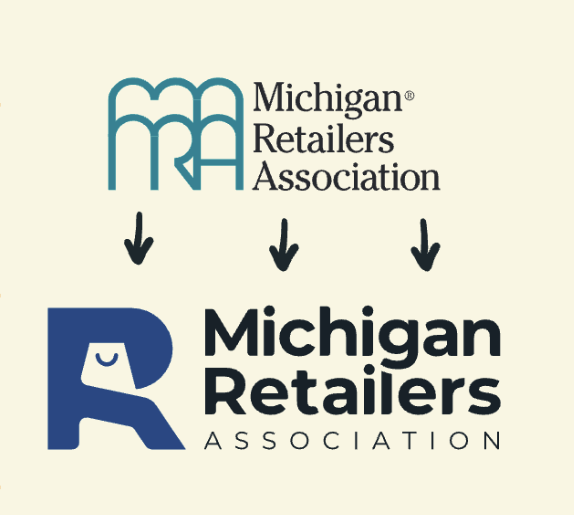Despite the snow and ice, it’s spring in Michigan
This update covers the tail end of the March session prior to the legislature’s two-week spring break and legislators’ first week back in regular session. The legislature will remain in session until almost the end of June while they finish up the FY 18-19 budget and attempt to tie up loose ends before campaign season gets into full swing.
Speaking of campaign season, the candidate filing deadline is coming up on April 24. Every single legislative office will appear on the ballot this year. Many legislators are term-limited or seeking different offices, which results in a lot of new candidates to evaluate. MRA will start the process of evaluating candidates through voting records and/or candidate questionnaires to determine who qualifies as a Friend of Retail. A list of candidates who meet our criteria as a Friend of Retail will be shared with MRA members prior to both the primary and general elections.
Use tax responsibility on owner-supplied materials
The Senate Finance Committee heard testimony and approved legislation at the end of March that seeks to clarify who is responsible for sales or use tax when a property owner supplies material that will be used by contractors. The bill, SB 887, was introduced after contractors ran into problems with the Michigan Department of Treasury. Treasury audited and assessed several contractors for Use Tax on owner-supplied materials for projects that affix tangible personal property to real property making it a structural part of the real estate. Committee members heard testimony from several contractors and were extremely sympathetic to the red tape contractors and property owners were forced to go through to prove to the department that sales or use tax was paid. The bill will clarify that the tax liability for tangible property purchased by another person and provided to a contractor for installation is the responsibility of the purchaser, not the contractor. Next step: Senate floor. | MRA Position: Monitoring, likely support.
Committee talks high-demand beer and wine and special events
The House Regulatory Reform Committee heard testimony on HB 5767–5768 last week. The bills would clarify and codify current rules on special licensees for events and address issues with product in high demand. HB 5768 would eliminate impediments to the flow of commerce by codifying and amending current rules that govern how beer and wine comes from suppliers to distributers to retailers. Under the bill, an exemption to skip a hold period on the wholesaler’s floor would be created for product in high demand. This would get beer and wine in high demand that frequently sells out quickly back in stock and on the shelves for retailers or for a special event.
HB 5767 would allow retailers to provide wine dispensing equipment for special event licensees. Currently, only beer dispensing equipment can be provided. Special licensees could also receive logoed tents for events. One last problem the bill seeks to address is extending the timeline for product deliveries to beer festivals or other events. Allowing delivery before the event’s licensed period solves the problem of trying to get delivery trucks in the day of the event. The changes would allow deliveries to take place once the festival or event has obtained a special license. Next step: House Regulatory Reform Committee vote. | MRA Position: Support.
House committee learns about pharmacy benefit managers
The House Health Policy Committee heard testimony from a representative of the Pharmaceutical Care Management Association (PCMA) about Pharmacy Benefit Managers (PBMs) last week. The committee got an overview of what a PBM is, what role they serve, and how manufacturer rebates are passed along to health plans, employers or government programs. A PBM is a company that works with a healthcare payer to administer the pharmacy component. PBMs attempt to help an insurer, employer or government program drive down the net cost of providing prescription drugs to consumers.
Committee members had lots of questions about PBM reimbursement to pharmacies and the impact in particular on smaller, independently-owned pharmacies. This hearing was one of many while the House digs into prescription drug pricing and the escalating costs of prescriptions and customer co-pays. Several weeks ago, the committee heard from drug manufacturers. While it has not been announced, it seems likely the chairman will also want to hear from health plans and pharmacies about their role in prescription drug pricing.
Other important items to note:
- Michigan Craft Beverage Council membership and duties: The House approved legislation last week that seeks to expand membership on the newly renamed Michigan Craft Beverage Council (formerly known as the Grape and Wine Council) and the duties of the council. HB 4667–4668 update references to the council throughout statute and would expand the council to include brewers and distillers. The House added language that prohibits a lobbyist from serving on the council and includes new duties related to marketing and education on craft beer and spirits. Next step: Senate Regulatory Reform Committee. | MRA Position: Neutral.
- On and off-premises alcohol licenses: HB 5760 would allow a business to simultaneously hold on and off-premises consumption licenses. Specifically, a person may apply for and hold a Class C license which allows for on-premises consumption of beer, wine, spirits, and mixed drinks as well as a Specialty Designated Merchant (SDM) license and a Specialty Designed Distributor (SDD) license. Next step: House Regulatory Reform Committee. | MRA Position: Support.
- Unemployment benefit increase: Legislation introduced as HB 5742 would increase the maximum number of weeks and the overall benefit amount individuals may receive unemployment benefits. The bill would nearly double the weekly benefit available to individuals and includes built-in increases to benefits each year. Next step: House Commerce and Trade Committee. | MRA Position: Oppose.
- Pseudoephedrine limits: Legislation that would set monthly and annual limits on the amount of pseudoephedrine an individual can purchase was introduced yesterday as SB 928. The bill would reduce the current monthly limit of nine grams in a 30-day period to 7.2 grams per 30 days, an amount MRA and other groups successfully negotiated last term, and 61.2 grams annually. The legislation mirrors HB 4373 introduced last year that is currently pending before the House Law and Justice Committee. While MRA would prefer no changes to the current pseudoephedrine limits, the limits in the bill are not seen as terribly problematic. Next step: Senate Health Policy Committee. | MRA Position: Neutral.
- Tianeptine sodium: SB 801, which added tianeptine sodium as a Schedule II drug, was recently signed into law as Public Act 107 of 2018. Tianeptine is used as an antidepressant with anxiety-reducing and mood elevating properties. The drug has been banned in some countries because of high levels of abuse and is not Food and Drug Administration-approved. It is not available for purchase in the United States but can be ordered online and imported. Next step: None. | MRA Position: Neutral.
- Year-end refills: Legislation recently introduced as HB 5737 would prohibit a health plan from denying a claim for a 90-day supply of maintenance medication merely because the refill request comes at the end of the calendar year. Next step: House Health Policy Committee. | MRA Position: Monitoring.
- Drones: The House reported legislation last week that would codify several of the recommendations made by the Unmanned Aerial Taskforce last fall. HB 5494–5498 would clarify that a drone is an extension of self for purposes of any crimes committed, prohibit using them in a manner to interfere with key facilities (certain manufacturing facilities, refineries, utility facilities, water treatment facilities and others as defined under the Michigan Penal Code) and establish an aeronautics commission. Knowingly using a drone to interfere with the operations of a key facility would be a felony punishable by four years in jail and/or a $2,500 fine. A similar package of bills was also introduced in the Senate as SB 917-922 and would go farther to also create an Unmanned Aerial Systems Joint Program Office. Next step: Senate Transportation Committee. MRA Position: Neutral.
- Firearm purchase restrictions: SB 934–938 introduced last week would require an individual have a federal national instant criminal background check performed within 30 days before purchasing a firearm. Under the legislation, firearms do not include pistols. Another bill in the package would prohibit certain individuals from being able to purchase or own firearms if a family member or other person files an extreme risk protection order for fear of the individual harming themselves or others. Next step: Senate Government Operations Committee. | MRA Position: Monitoring.
- Local dog breed restrictions: The Senate recently reported legislation (SB 741) that would prohibit local units of government from enacting or enforcing ordinances, policies, resolutions or rules regulating a dog based on breed or perceived breed. Next step: House Local Government Committee. | MRA Position: Support.
- Modernizing substitution pricing: Legislation MRA has been seeking to modernize archaic statutory language related to prescription pricing when a substitution occurs was introduced as HB 5805 last week. The majority of the House Health Policy Committee members cosponsored the bill and the chairman has tentatively scheduled the bill for a hearing in two weeks. Next step: House Health Policy Committee. | MRA Position: Support.
- Nitrous oxide canisters: HB 5463–5464, legislation that would prohibit the sale or delivery of nitrous oxide canisters to minors, was recently approved by the Senate Judiciary Committee. The bills attempt to solve the problem of teens using “whip-its” to get high. Misused nitrous oxide can cause brain damage and even death. The canisters are most commonly used to make whipped cream. Next step: Senate floor. | MRA Position: Monitoring.
- Pyramid schemes/direct selling entities: Legislation that clarifies what is and what is not considered a pyramid scheme was recently approved by the House Commerce and Trade Committee. HB 5726–5729 strengthen state law to stop bad actors and will help clear up public confusion over which direct selling companies are legitimate. The Attorney General requested several amendments that were adopted by the committee. Changes include removing references to an administrative hearing process through the AG’s office and instead clarifies AG’s civil investigation process that they use for other consumer protection investigations. Other changes made to the bills more clearly define what is an appropriate inventory repurchase program. In addition, the penalty for operating a pyramid scheme was increased to a felony punishable by up to seven years in jail and up to $10,000 in fines which mirrors the state’s Franchise and Investment Act. Next step: House floor. | MRA Position: Support.
- Ransomware: Gov. Snyder recently approved two bills that will prohibit the unauthorized possession or use of ransomware. HB 5257–5258 add new penalties for anyone who possesses and intends to use ransomware to harm, steal or prevent access to another person’s electronic data. The new laws take effect on July 1. Next step: None. | MRA Position: Support.
- PPT exemption clarification: The Senate Finance Committee reported a bill that would modify the current process for filing the commercial Personal Property Tax (PPT) exemption for commercial personal property with a true cash value of less than $80,000. Under current law, taxpayers must file an exemption form with the local unit of government each year. HB 5261 would only require an exemption to be filed the first year and would not require any additional filings unless the property is no longer eligible for the exemption. Next step: Senate floor. | MRA Position: Support.






